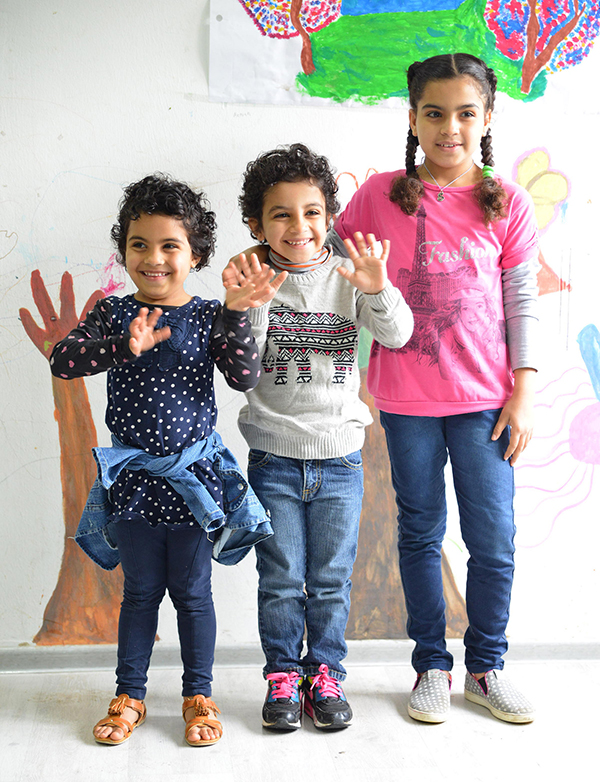 North West Balkans
North West Balkans
Languages
The border games

“I was not afraid!” – 11 years old Selma* is adamant while talking about the two days her family spent in a detention unit on the Croatian border. She even helped translating between her parents and border police.
Selma’s* left her native Iraq with her parents and two sisters two years ago, looking for a better place for their three daughters to grow up. Selma is the eldest, her sister Hanan* is 8, and Hiba* is 6.
Their life on the route was not without difficulties, but they made good progress until they came to Bosnia and Herzegovina (BiH). Here, they are stuck in a north-western town of Bihac, in close proximity to border with Croatia, a European Union country. And yet, this family is desperate to continue their journey. So much that they have tried the so-called “game” 17 times. This game has only one goal for migrants and refugees - to cross the Bosnian-Croatian border and continue journey towards Western European countries such as Germany, France and Sweden.
Selma*s family was caught and returned to BiH from the border each of the 17 times.
“Being a family with children, we weren’t exposed to physical violence, but we were returned without our possessions. Without phones, money, even the sleeping bags - they took everything. Once we were detained for two days in a room without any windows, we didn’t know if it was day or night. This was difficult for the kids, my youngest daughter has a fear of closed-in spaces, she cried and begged to be let out, but she wasn’t allowed,” tells us Asiya*, the mother.

Thousands of refugees and migrants travelling through the Western Balkans Route testified about irregular push-backs at various borders in the region. Thousands of people are returned from the countries along the route without being given an opportunity to seek asylum. Hundreds testified about border guards using excessive force, pushing and beating people with hands and batons and taking away their possessions, especially money and phones.
Selma’s family will keep trying to cross the border, as they are not only looking for a safer and better place to live in, but also for a place where Hanan* will get medical treatment she needs.
“Because of Hanan’s* treatment, we want to go to Luxemburg. She has a problem with her spine since birth and cannot grow properly,” explains Asiya*.
In Bihac, all three girls are enrolled in school. Selma* likes it there.
“It’s nice in school, we play and learn. I like math and English best. English I can’t write well, but I can speak,” she says, adding that she sees herself as a dentist in the future.
She doesn’t have many friends, only one in the camp, but she knows what makes a good friend.
“They play together nicely and they don’t fight.”
This Iraqi family currently stays in a reception centre in Bihac. For families with children staying at the Bihac centre, Save the Children works in partnership with UNICEF to run a mobile Child Friendly Space, in an EU-funded project. Child Friendly Spaces provide a safe environment for the youngest where they can regain the sense of normalcy and structure through organized activities of playing, socialising and learning. Here they can express their fears and reasons for joy. This way, children can rebuild their resilience that will enable their further development.
Save the Children’s team comes on a daily basis to set up a workshop space and help children with their homework, conduct various educational activities or facilitate art projects or fun games. All the activities are carefully created to help children overcome trauma and better cope with dynamics of a life in a migrant and refugee reception centre.
Over 34,000 migrants and refugees reached Bosnia and Herzegovina since the begging of 2018 on their way towards Western European countries. Many of them are forced to temporarily stay in the country after being rejected entry to neighbouring Croatia.
Save the Children is working to provide support to migrant and refugee families with children and unaccompanied and separated children staying in the country. Our child protection team works 24/7 with over 260 unaccompanied and separated children (all of whom are boys staying in Bihac) as well as supporting other social protection centres and front line workers in providing adequate services to the most vulnerable children.
Ensuring no children are left outside education, Save the Children’s team, in partnership with UNICEF in an EU-funded project, also provide support to refugee and migrant children in school enrolment, including logistical support such as school escorts, transport, school meals and language assistance.For families with young children, we run three operational Mother and Baby Corners in the area, where families with babies and infants can get basic food and hygiene products and services.
*Names are changed in order to protect children’s identity